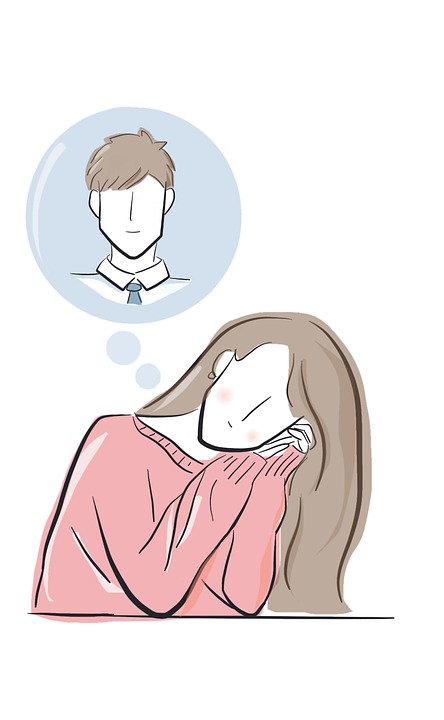Infatuation refers to an intense but short-lived feeling of admiration or attraction towards someone or something. It is often relates to an intense passion. Moreover, a strong desire to be near the object of infatuation, and a tendency to idealize or romanticize the person or thing.
Infatuation is a type of love, but it differs from genuine love in several key ways. While love is the foundation of trust, mutual respect, and understanding. On the other hand, adoration is based more on physical attraction, curiosity, and a sense of excitement or novelty. Admiration can also be more fleeting and less enduring than true love. Furthermore, it may dissipate as quickly as it arises.
Causes
Infatuation can be caused by a variety of factors, including physical attraction, novelty, admiration, and projection. Here are some of the most common reasons people experience infatuation:
Physical attraction: Physical appearance is often the first thing that attracts us to someone. When we find someone physically attractive, we may experience adoration as we become fixated on their appearance.
Novelty: Admiration can also be caused by the excitement of something new and unknown. When we encounter someone we have never met before, we may become infatuated with them as we explore the possibilities of what could be.
Admiration: Infatuation can also arise when we admire someone’s qualities or accomplishments. We may become infatuated with someone who we perceive as successful, talented, or intelligent.
Projection: Infatuation booms projecting our own desires and fantasies onto someone else. When we imagine someone to be our perfect partner or ideal match, we may become infatuated with them. We project our own desires onto them.
Admiration is a complex emotional state that can be influenced by a wide range of factors.
Features
Infatuation is a powerful emotional state that associates several key features. Here are some common features of infatuation:
Intense attraction: Infatuation is often characterized by an intense physical or emotional attraction to the object of infatuation. The person experiencing infatuation may feel a strong desire to be near the other person. In addition, may experience physical symptoms such as butterflies in the stomach or a racing heart.
Idealization: Infatuation can also involve idealizing the object of infatuation. The person experiencing infatuation may see the other person as perfect, flawless, or idealized in some way. Furthermore, may overlook any flaws or negative traits.
Focus on the present: Infatuation tends to focus on the present moment and the immediate feelings of attraction or infatuation, rather than long-term compatibility or shared values.
Lack of deep understanding: Infatuation often involves a lack of deep understanding or knowledge of the other person. The person experiencing adoration may be more focused on their own feelings and desires than on truly getting to know the other person.
Short-lived: Adoration is often short-lived. The feelings may dissipate quickly as the initial feelings of attraction fade. The person realizes that the other person is not the idealized version they had imagined.
Admiration can be an intense and exciting emotional state. However, it is important to distinguish it from deeper, more lasting forms of love.

Infatuation and love
Infatuation and love are different emotional states. But it is possible for adoration to evolve into a deeper, more lasting form of love over time. Here are some factors that can contribute to a shift from admiration to love:
Shared experiences: As two people spend more time together and share experiences, they can develop a deeper understanding and appreciation of each other. Consequently, can lead to a more enduring emotional connection.
Emotional intimacy: Building emotional intimacy through open communication and vulnerability can also contribute to a deeper emotional connection. This can evolve into love.
Shared values: As two people get to know each other better, they may discover shared values and goals, which can strengthen their emotional bond.
Deeper understanding: Over time, the idealized version of the other person that may have fueled the infatuation can give way to a deeper, more nuanced understanding of who they truly are, including their flaws and imperfections.
Infatuation and love are different emotional states. It is possible for infatuation to evolve into love over time as two people develop a deeper connection and understanding of each other.
Similarities and differences
Infatuation and love are two distinct emotional states, but they share some similarities and differences. Here are some of the key similarities and differences between infatuation and love:
Similarities:
Admiration and love involve strong feelings of attraction towards another person.
Both can cause physical symptoms such as increased heart rate, butterflies in the stomach, and sweaty palms.
Love and admiration can lead to an intense desire to be near the other person.
Both can involve feelings of happiness and excitement.
Differences:
Infatuation is typically more focused on physical attraction and excitement. While love is more focused on emotional intimacy and long-term commitment.
Infatuation is often short-lived and based on a superficial understanding of the other person. Love is enduring and based on a deep emotional connection and understanding.
Admiration can involve idealizing the other person and overlooking flaws. On the contrary, love involves accepting the other person for who they truly are, including their imperfections.
Infatuation can be more self-focused and focused on one’s own desires and needs. Love involves a greater concern for the other person’s happiness and well-being.

Duration
The duration of infatuation can vary from person to person. But it is relatively short-lived emotional state. Admiration is an intense feelings of attraction and excitement that can fade over time as the initial rush of emotions subsides or as the person comes to a more realistic understanding of the other person.
Some people may experience admiration for only a few days or weeks, while others may experience it for several months. However, in general, admiration tends to be a temporary emotional state that is more fleeting than enduring forms of love.
It’s worth noting that the duration of infatuation can also depend on individual circumstances and factors such as the nature of the relationship, the level of emotional and physical intimacy, and the personalities and values of the individuals involved.
Infatuation – Conclusion
In conclusion, infatuation is an intense emotional state that links strong feelings of attraction and excitement towards another person. Moreover, based on a superficial understanding of the other person. It includes focus on physical attraction and idealization. Adoration can evolve into a deeper, more lasting form of love over time through shared experiences, emotional intimacy, shared values, and deeper understanding of each other. However, love is a more enduring emotional state that is based on a deep emotional connection and understanding. It also includes acceptance of the other person’s flaws and imperfections. Understanding the differences between admiration and love can help individuals navigate their relationships. Moreover, helps to make informed decisions about their emotional and romantic lives.
